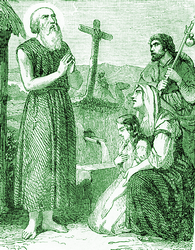Lives of the Saints
Our Models and Protectors
Spiritual Bouquet:
October 22

Saint Hilarion
Patriarch of the Solitaries of Palestine
(† 372)
Saint Hilarion was born of pagan parents near Gaza, and was converted while studying grammar in Alexandria. He renounced games, the theater and all the vain amusements of young people, to attend the reunions of his fellow Christians. He desired to see the great Saint Anthony in the desert and went to Egypt, where he remained near him for two months. He carefully observed everything in his life and conduct — his affability, his gentleness towards others and his severity towards himself, then returned to Palestine with a few solitaries to settle his affairs. His father and mother had both died, and he kept nothing of his heritage for himself. At this time he was only fifteen years old.
Despite his youth and delicate health, he retired to a desert; he practiced severe mortification, tempted continually by the demons expending all their efforts to make him abandon this life of total renouncement. He redoubled his austerities, tilled the ground and, following the example of the Egyptian monks, made baskets of reeds and willow branches. He lived first in a cabin of reeds, then in one of clay, so low and narrow that it seemed more like a tomb than a lodging for a young man. He learned all of Holy Scripture by heart and repeated it with admirable devotion. When thieves approached him one day he told them he did not fear them, because he had nothing to lose, and death did not alarm him since he was ready to die. They were so touched by his answers they promised him to abandon their life of pillage.
He soon began to work miracles by his prayers, and visitors made their way to his former solitude. Several remained nearby to become his disciples, and thus gave rise to the monastic life in Palestine, of which Hilarion is regarded as the founder. Saint Anthony esteemed him highly, sometimes wrote him letters, and sent to him the sick persons who came to him from Syria, telling them they had no need to make so long a journey. Saint Hilarion was a master exorcist and healer of all illnesses, but he refused all remuneration for his assistance, saying to his visitors from the city that they were better placed than he to distribute in alms the money they were offering him. Frequently the scattered solitaries of Palestine came to him to listen to his instructions, and he also visited them. The pagans too gathered around him. His exhortations to abandon idolatry were so powerful that on one occasion a group of Saracens promised to convert, asking him to send them a priest to baptize them and establish a church. One day, accompanied by three thousand persons who were following him, he blessed the vine of a solitary who received him. The vine furnished a triple harvest and all in the crowd were well nourished.
Saint Hilarion found his solitude transformed into a city, and decided at the age of sixty-five to go elsewhere. His Palestinian disciples attempted to change his mind without success, and taking with him only forty monks, he set out for Egypt on foot. Saint Anthony had recently died, and he wished to visit the places where he had dwelt. After spending some time in Egypt, he went with only two religious to a village a few days' distance from Babylon. He remained only a short time there also, afterwards going elsewhere, and everywhere assisting those who had recourse to his prayers. In Sicily he delivered a demoniac, and then a crowd came to surround him once again. In Dalmatia he worked still more miracles, and saved a city from being engulfed by tidal waves raised by an earthquake. These traditions are still alive in the regions where he passed. He tried many times to live unknown but never could succeed.
Saint Hilarion died in 372 on the island of Cyprus, at the age of seventy years. His last words were: Go forth, my soul; why dost thou doubt? Nigh seventy years hast thou served God, and dost thou fear death? His body was found incorrupt some time afterwards, and was transported to Palestine to his original monastery. Saint Jerome was his original biographer.
Les Petits Bollandistes: Vies des Saints, by Msgr. Paul Guérin (Bloud et Barral: Paris, 1882), Vol. 12